Uspsbm.com is a fraudulent website that sends phishing emails and text messages impersonating the United States Postal Service. These official-looking messages claim there is an issue with delivering your package and provide a link to Uspsbm.com, directing victims to enter personal and financial details under the guise of resolving shipping problems. However, the site is not associated with USPS and is merely a scam to harvest users’ sensitive information for criminal purposes.
Overview of the Uspsbm.com Scam
Uspsbm.com is a fraudulent website that pretends to be the official USPS site. The scammers behind it send out emails and text messages claiming there is an issue with your package delivery that needs to be resolved on their website. The messages contain links to Uspsbm.com, where users are prompted to enter sensitive information under the guise of confirming their shipping details.
In reality, Uspsbm.com has no association with the United States Postal Service. By entering your information, you risk exposing yourself to identity theft, credit card fraud, and other types of cybercrime. Unfortunately, the website looks convincing enough to fool unsuspecting users into submitting their data.
The Uspsbm.com scam takes advantage of people’s reliance on package deliveries. With so many consumers accustomed to online shopping and receving frequent updates from carriers like USPS, this ruse can seem legitimate at first glance. However, any message that asks for your personal or financial information over the internet should raise red flags.
How the Uspsbm.com Scam Works
The Uspsbm.com scam typically starts with an email or text message designed to lure victims to the fake website. Here is a closer look at how the scheme unfold:
Scam Emails
The scam emails are made to look like they are from the official USPS email address, usps.com. The subject line often says something about an unsuccessful delivery attempt or a need to update your shipping details.
The body of the email will claim there is some kind of problem with delivering your package, and you need to click on the provided link to Uspsbm.com to resolve the issue. Some examples of these fake shipping problems include:
- Issue with your shipping address
- Failed delivery attempt
- Shipping label problem
- Additional shipping fee required
- Customs clearance problem
Of course, these are just tricks to get you to visit the scam website. The emails may include a fake tracking number and suspicious links, but everything is designed to look like legitimate correspondence from USPS.
Scam Text Messages
Similarly, the fraudulent text messages are made to appear as if they are from USPS. The texts also claim there is a delivery issue that requires you to click on the Uspsbm.com link and enter your information.
Some examples of scam text messages include:
- USPS: Your package has been delayed due to an issue with your shipping address. Please update your information here: Uspsbm.com/us123456789
- USPS Alert: We were unable to deliver your package. Please click here to resolve this issue: Uspsbm.com/us987654321
- USPS: Additional shipping fee of $2.99 is required to complete delivery by Monday. Pay now: Uspsbm.com/us123456709
The scam texts may include a fake tracking number to add legitimacy to the ruse. But in reality, the links lead only to the fraudulent website.
Visiting the Fake Website
When victims click on the link in the email or text message, they are taken to the Uspsbm.com website. This site is designed to closely resemble the real USPS site, featuring the same logo, colors, and general layout.
On the website, you are prompted to enter personal details in order to allegedly fix the shipping problem mentioned in the scam message. The forms on the site request information like:
- Full name
- Home address
- Phone number
- Email address
- Credit card number
- Credit card expiration date
- CVV code
After entering your sensitive data, you are likely to receive an “error” message saying there is still a problem and you should contact customer support. In reality, this is just another ploy to collect more of your information.
At no point do the scammers actually resolve the made-up delivery issue. The only purpose is to steal your personal and financial information while you think you are completing a transaction with USPS.
What to do if You Have Fallen Victim to the Scam
If you entered your information into Uspsbm.com, there are steps you should take right away to protect yourself:
Contact Your Credit Card Company
If you provided your credit card information on the scam website, immediately call your credit card company. Alert them that your card details may have been compromised. They will likely close your current card and issue you a new one to prevent fraudulent charges. Also closely monitor your statements for any suspicious transactions.
Place a Fraud Alert
Consider placing a fraud alert on your credit report. This alerts creditors that they should take extra steps to verify your identity before issuing new credit in your name.
Reset Online Account Passwords
If you used the same login information on Uspsbm.com as other sites, immediately change those passwords. Prioritize accounts like banking, email, social media, and shopping sites. Enable two-factor authentication whenever possible for an extra layer of security.
Monitor Your Accounts
Keep a close eye on all your financial accounts in the days and weeks after your information was compromised. Look for any unauthorized activity and report it immediately. The sooner you spot something suspicious, the quicker you can take action.
Consider a Credit Freeze
Placing a credit freeze restricts access to your credit report, making it harder for identity thieves to open fraudulent accounts. If you do a credit freeze, you will need to lift it temporarily when applying for new lines of credit. This process can take up to 3 business days. There may be fees associated with freezing and unfreezing your credit.
File a Police Report
It’s recommended that identity theft victims file a report with local law enforcement. Having an official report on record can help when disputing fraudulent accounts. Give the police as much detail as possible about the scam website and when your information was compromised.
Report the Scam Website
To prevent others from falling prey, report the Uspsbm.com website to:
- The USPS Postal Inspection Service online complaint form
- The FBI’s Internet Crime Complaint Center (IC3)
- The FTC via their online complaint assistant
Reporting the site helps authorities build cases against scammers and work to shut them down. Just make sure not to click on any Uspsbm.com links when reporting!
Run an antivirus scan
If you suspect your device became infected from visiting the fraudulent website, immediately scan it with trusted anti-malware software like Malwarebytes. This can detect and remove any viruses, spyware, or other malicious programs that may have been downloaded to your system without your knowledge.
How to Avoid Falling Victim to Similar Scams
While Uspsbm.com may not be around forever, similar scams impersonating government agencies and delivery carriers continue to emerge. Here are some tips to recognize and avoid them:
- Look for poor spelling/grammar: Scams tend to contain typos, awkward phrasing, and grammatical errors. Authentic companies will have proper writing.
- Verify the sender: Instead of clicking links, go directly to the company’s official website. Contact them to ask if they sent the message.
- Check for your personal info: Legitimate companies will address you by name in emails, not “Dear customer.” Be wary of messages with vague addressees.
- Beware urgent calls to action: Scammers try to rush you into clicking links and providing info. Take time to think before responding.
- Hover over links: Check that embedded links match the brand’s real URL, not some sketchy alternative website.
- Never send sensitive data over email/text: Legit companies will not ask for things like account passwords or Social Security numbers remotely.
- Use security software: Antivirus and anti-malware programs can detect phishing scams and block malicious sites. Enable firewalls as an added layer of protection.
- Set up email spam filters: Configure your email provider to filter out obvious scam messages so you never see them.
Staying vigilant is your best defense against schemes like the Uspsbm.com scam. Share this information to help friends and family avoid being victimized. Report scams to prompt investigations that can shut down criminal operations and prevent further victims.
Frequently Asked Questions About the Uspsbm.com Scam
What is Uspsbm.com?
Uspsbm.com is a fraudulent website that sends scam emails and text messages pretending to be from USPS. The messages claim there is an issue with delivering your package and direct you to the fake site to resolve it.
How does the scam work?
The emails and texts trick you into visiting Uspsbm.com where you are prompted to enter personal and financial details to allegedly fix a fake shipping problem. In reality, the site just steals your information.
What information do the scammers ask for?
The scam site requests your full name, address, phone number, email address, credit card details, driver’s license number, and other sensitive info.
What do the scam messages look like?
The emails are disguised as USPS notifications with subjects about delivery issues. The scam texts also claim to be from USPS and insist you click on the link to avoid shipping delays or fees.
Are the tracking numbers real?
No, any tracking numbers included on the emails or texts are completely fake. They are made up by the scammers to look legitimate.
What happens after I enter my information?
After submitting your data, you’ll likely get an “error” message. The scammers already have your details at that point. They do not actually provide any customer service.
How do I know if a USPS notification is real?
Go directly to usps.com and contact customer support to ask about any shipping notices. Do not click on links or call numbers provided in suspicious emails/texts.
What should I do if I entered information on the site?
Immediately contact your credit card company to close your account. Place fraud alerts, monitor your credit reports, reset passwords, file a police report, and report the scam to the authorities.
How can I avoid this scam?
Watch for poor grammar, urgent pleas, impersonal addressing, and sketchy links in messages. Independently look up real contact info and verify anything suspicious directly with the company.
Who is behind this scam?
Uspsbm.com is run by anonymous cybercriminals. By reporting the scam, authorities can potentially investigate and identify those responsible.
In Conclusion
The Uspsbm.com email and text message scam demonstrates how fraudsters constantly impersonate trusted brands like USPS to fool users into giving up valuable personal data. They rely on convincing web designs and urgent sounding messages to trick people before they have time to think it through.
Now that you understand their deceptive tactics, you can keep yourself protected.Going forward, apply extra scrutiny whenever contacted about a delivery issue over email or text. Look for the warning signs of a scam, like strange links, pressure for fast action, or requests for sensitive information. Avoid being rushed into anything – stop and independently verify the situation first. If in doubt, reach out to the legitimate company directly, not via the provided contact info.
Staying vigilant about scams is crucial in our increasingly connected world. But a few precautionary measures can help safeguard your identity and assets. Pay attention to security, think before acting, and confirm things through separate channels. Keeping your wits about you online can prevent you from falling victim to the next scam trying to catch you off guard.

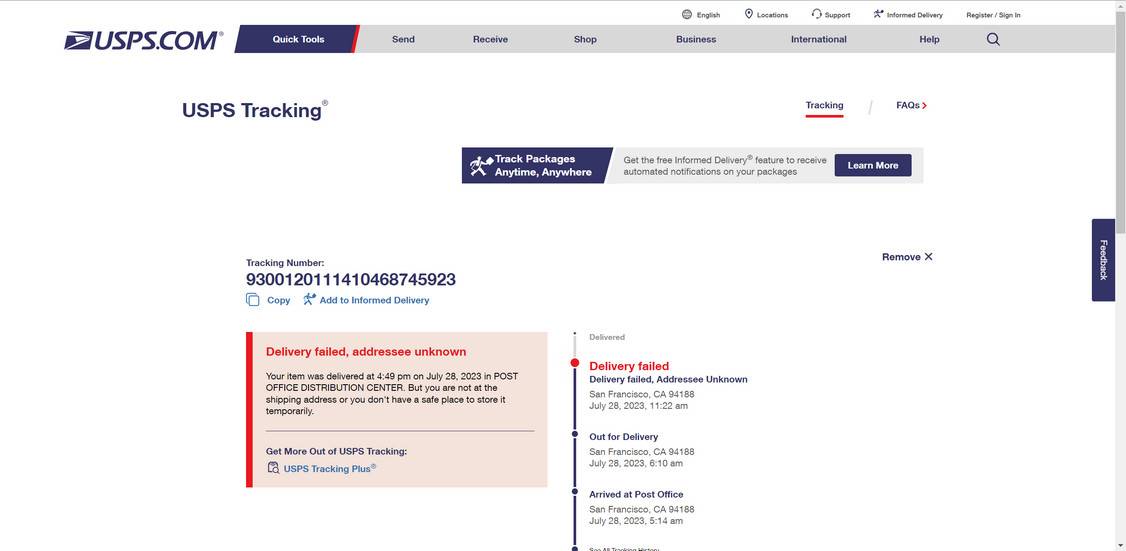
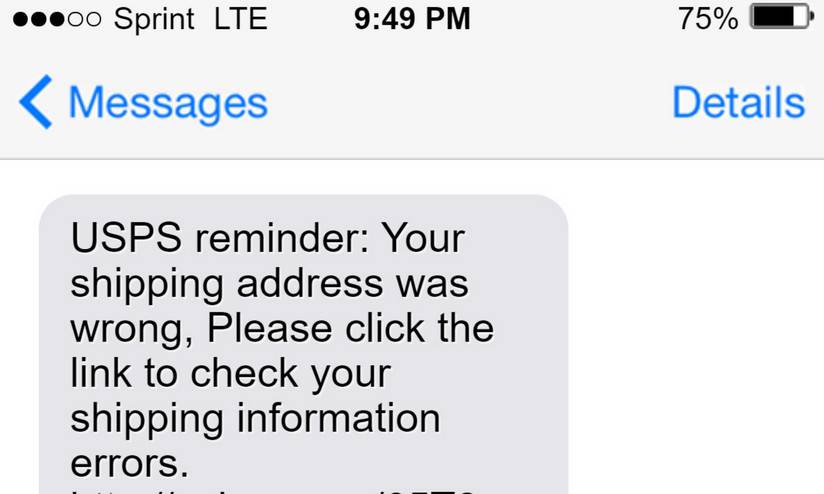
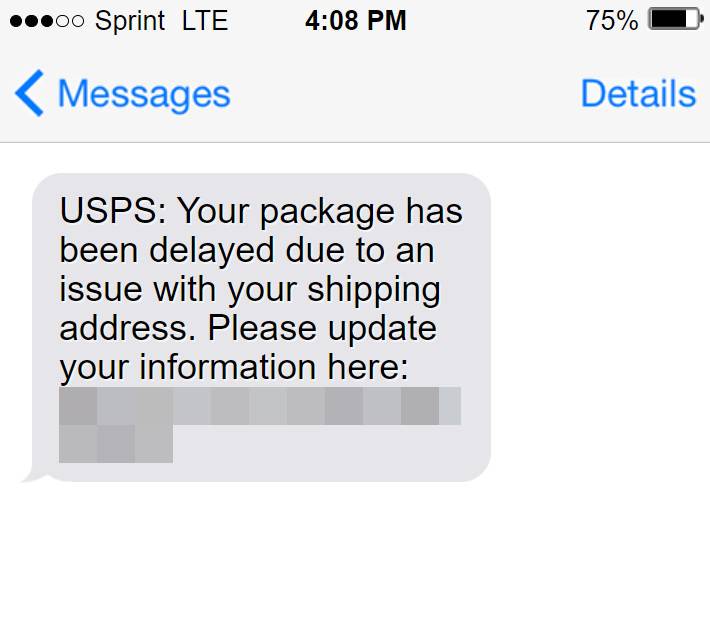
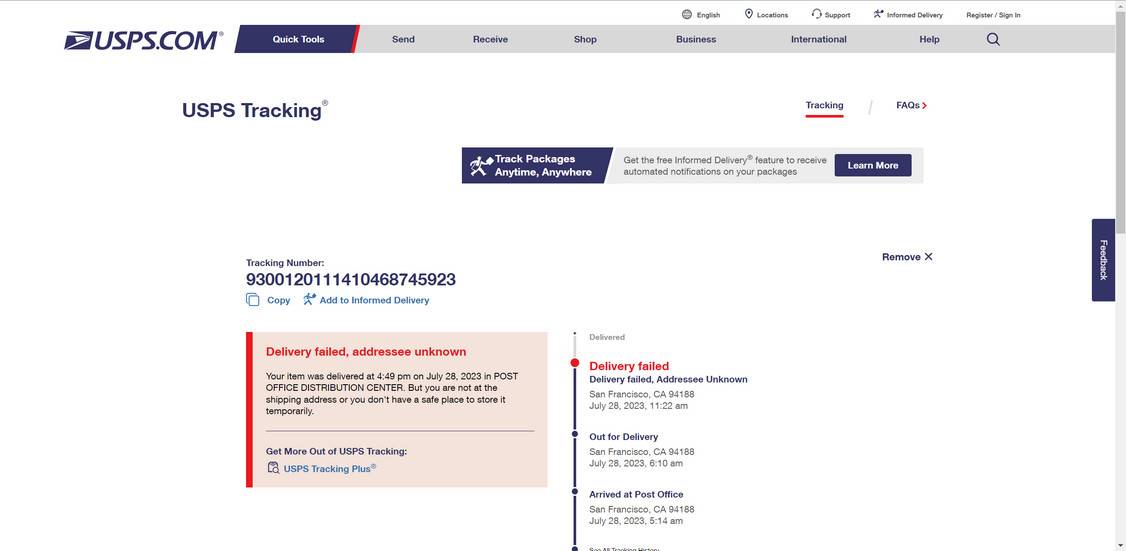
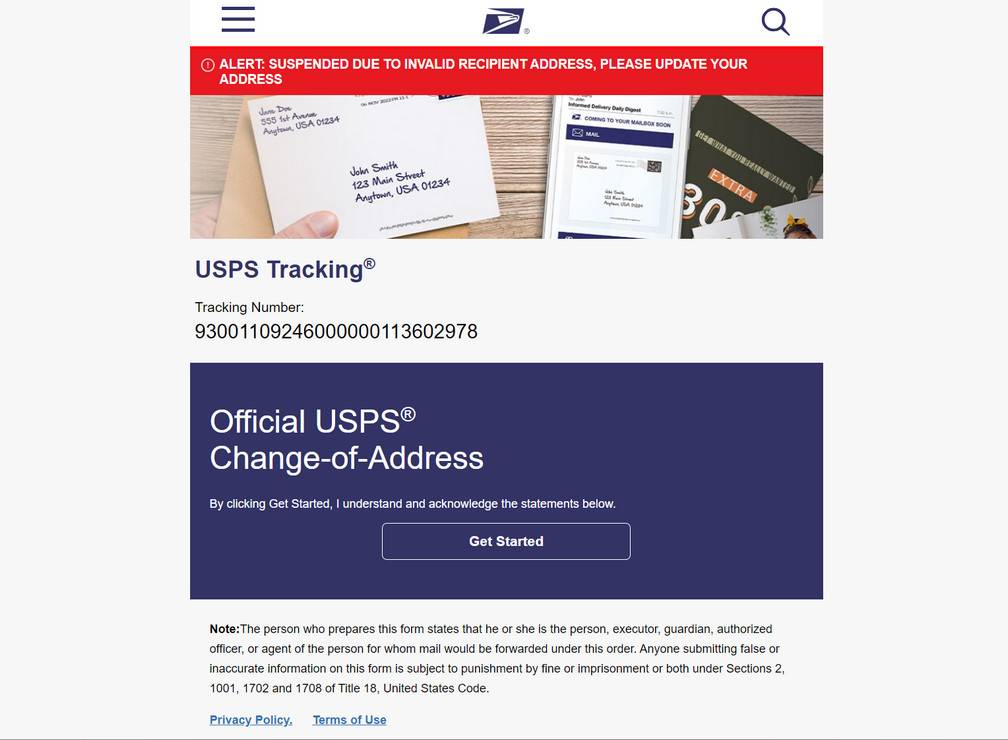

![Remove Iptil.adsstreamline.top Pop-ups [Virus Removal Guide] 9 McAfee scam 4](https://malwaretips.com/blogs/wp-content/uploads/2023/08/McAfee-scam-4-290x290.jpg)

